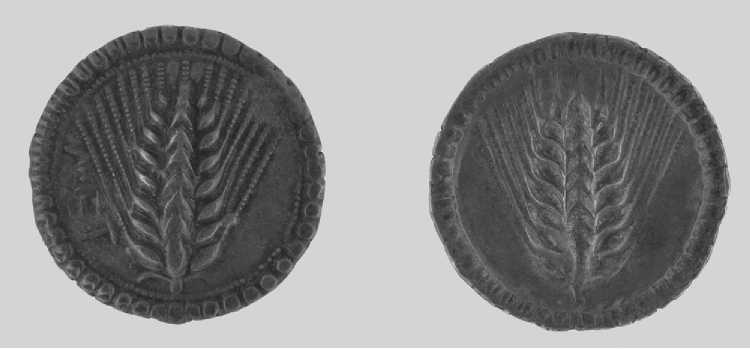This inscription (Fornara, Nr. 18), from the fourth century bc, was found at Cyrene. It allegedly contains, however, a text from the seventh century, a decree of Thera which regulated the settlement of the colony of Cyrene. If this latter text should be genuine, then it is the only extant documentary text contemporary with the colonizing movement of the eighth and seventh centuries. On the authenticity of the text in question, see below.
God. Good fortune.
Damis, son of Bathycles, moved the motion: Concerning what the Therans [i. e., their envoy] Cleudamas, son of Euthycles, said, so that the city (of Cyrene) may prosper and that the People of Cyrene may have good fortune; (the Cyrenaeans) are to grant the Therans citizenship according to the ancestral rules which our forefathers made, both they that founded Cyrene from Thera as well as they that remained on Thera, even as Apollo gave good fortune to Battus and to the Therans who founded Cyrene provided that they abode by the oaths which our forefathers themselves swore to them, when they sent out the colony according to the command of Apollo Archagetes; (wherefore,) for good fortune, be it resolved by the People (of Cyrene):
That the Therans shall continue to have equal citizenship in Cyrene also in accordance with these same rules; that all Therans resident in Cyrene shall swear the same oath which once the others swore; that (the Cyrenaeans) are to induct them into a tribe and a phratry as well as into nine associations; and (the
Cyrenaeans) are to inscribe this decree upon a marble column; to set up the column in the ancestral sanctuary of Apollo Pythius; to inscribe the oath too on the column that the settlers made who sailed to Libya with Battus from Thera to Cyrene; as to the expense necessary for the stone or for the inscribing, let the Managers of the Accounts provide it from Apollo's revenues.
Covenant (literally: oath) of the Settlers:
The Assembly (of Thera) has resolved: Since Apollo of his own accord told Battus and the Therans to found Cyrene, the Therans have resolved to send Battus as Archagetes [i. e., "First Founder"] and King out to Libya and that Therans are to sail as his companions. On equal and like terms are they to sail according to household with one son to be selected. . . [for the space of about twenty letters the text here is either unintelligible or missing] . . . and those who are of age and of the other Therans those who are free... [some six letters missing] . . . are to sail. If the colonists establish the colony, then a kinsman [i. e., a Theran] who sails later shall hold both citizenship and (be eligible for) office (in Cyrene) and he shall obtain (a plot of) unowned land. But if they do not establish a colony and the Therans are unable to aid them, but hardships afflict (them) for five years, then from that land are they without fear (of redress) to depart for Thera back to their own property and they are to be citizens (of Thera). But anyone who should refuse to sail when the city sends him out shall be liable to the death penalty and his property shall be confiscated. Anyone that takes him in or that hides him, be he a father (hiding) a son, or a brother (hiding) a brother, shall suffer the same things as he that refused to sail. On these terms they that remain here (on Thera) and they that are sailing to found (a colony) have made a covenant and they have cursed them that should transgress against it and not abide by it, whether amongst them settling in Libya or amongst them remaining here. Having made images of wax they burned them when all had assembled, men, women, boys, and girls; and they made a curse (as follows): "Who should not abide by this covenant, but should transgress against it, may he melt and flow away Just as these images, he himself and his descendants and his property; but for them that abide by this covenant, both them that are sailing to Libya and them that remain on Thera, let there be abundance of good things, both for them and for their descendants."
The first two sections of the inscription deal with the grant of full Cyrenaean citizenship (and all which that entailed) to any Therans currently resident in Cyrene and to any Therans who should arrive later. The third section, however, purports to present the seventh-century Theran decree which authorized the foundation of the colony at Cyrene and which contained a provision for the grant of Cyrenaean citizenship to any Theran who sailed to the colony at a later date. Initially, scholars dismissed this "decree within a decree" as a fourth-century forgery ad hoc, but later investigations (see Graham 1960 and Jeffery 1961 in the Further Reading) showed that this dismissal was overhasty, and the decree's content itself does not appear to be faked.

Figure 5.1 Coin from Metapontum. Source: Numismatic Collection Transfer, 2001. Purchased 1963. Acc. n.: 2001.87.456. Photo © Yale Uniersity Art Gallery/Art Resource, NY/Scala, Florence
The next consideration involved defensibility. Because all the early colonies lay in non-Greek regions - only in the fifth century do the Greeks begin to found colonies in Greek areas - conflicts with the non-Greek inhabitants were a real danger. The poet Archilochus, who in the mid-seventh century BC had gone from Paros to the colony Thasos in the northern Aegean, speaks of fighting between the colonists and the indigenous Thracians (Fr. 5 West). The Milesian colonists around the Black Sea had to wage war against the Scythians (Ephorus, BNJ 70, Fr. 183). The first colonists of Metapontum eventually abandoned the site circa 600 BC, allegedly owing to attacks from the indigenous inhabitants of the region (Strabo, VI 1,15, p. 264); and the second colonists waged war against the native Oenotreres (Antiochus of Syracuse, BNJ 555, Fr. 12).
In addition to attacks from indigenous populations there were others busily founding colonies who did not desire the competition: the Carthaginians and even other Greeks. The Carthaginians from North Africa together with the Etruscans from central Italy attacked Phocaean colonists at Alalia on Corsica in the mid-sixth century BC (Hdt. I 166); and the Carthaginians’ hostility certainly helped keep the Greeks out of the far West where the former had extensive interests. Meanwhile, Corinthian settlers coming to Corcyra drove out the original colonists from Eretria in the late eighth century (Plutarch, Greek Questions, 11). It was not just the Oenotreres against whom the Metapontines waged war; they also fought against the Tarantines, Greek colonists from Sparta (Anti-ochus of Syracuse, l. c.).




 World History
World History









